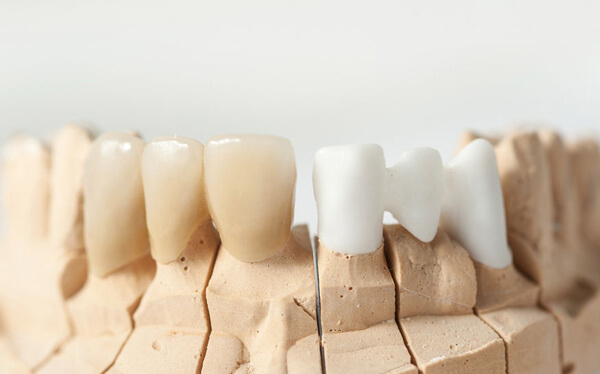Bridge and Dental Implant Candidates
In general, whether you are able to get a bridge or a dental implant depends on your oral health. While either option can provide a solution for those missing one or more teeth, there are requirements for being eligible.
If you have two healthy teeth on either side of your missing tooth, you may be a candidate for a bridge. In order to be a candidate for dental implants, you must have healthy gums and good bone density. This means that issues such as gum disease will need to be addressed before the implant can be placed. Some people also require a bone graft in the jaw before they are able to accept an implant.
What Are Dental Bridges?
Dental bridges are used to “bridge” the gap between one or more missing teeth. A dental bridge is made up of two or more crowns that are affixed to adjacent natural teeth or dental implants. The teeth that anchor the bridge are called “abutment” teeth, and the false teeth on the bridge are called “pontics.”
What Are the Pros of Bridges?
There are a number of advantages to getting dental bridges. They include:
- Simplicity – Bridges don’t require surgery and are put in place via a simple and mostly painless procedure.
- Restored function – Bridges restore a patient’s ability to chew and speak properly.
- Affordability – Bridges may be less costly than other options.
Cons of Dental Bridges
Of course, there are also disadvantages to getting dental bridges. Some disadvantages are related to:
- Aesthetics – A bridge is not as natural-looking as dental implants.
- Maintenance – Typically, bridges must be replaced every five to seven years.
- Other dental issues – The natural teeth adjacent to a bridge can be damaged.
What Are Dental Implants?
A dental implant is a replacement tooth that is implanted surgically using a titanium post that is placed into the jawbone. Over time, the post fuses with a bone to provide a permanent “root” for the replacement tooth. Implants can be used by themselves or with bridges and dentures to provide a whole-mouth solution for missing or failing teeth.
What Are the Pros of Dental Implants?
Dental implants offer several advantages over other solutions because they are:
- Low Maintenance – Dental implants require very little maintenance, which is why they can last a lifetime.
- Natural-Looking – Dental implants look natural and even feel like natural teeth.
- Protective – Dental implants protect the jawbone and preserve natural bone growth.
- Low Impact – A dental implant doesn’t put a strain on natural teeth in the way that a bridge can.
What Are the Cons of Dental Implants?
Of course, there are also disadvantages to dental implants. They require:
- Surgery – Dental implants must be attached to the jawbone, so minor surgery is required.
- Time – Dental implants require planning and preparation before they can be put in place. In many cases, it can take three months or more to complete the entire procedure.
- Investment – While dental implants can provide a long-term solution for missing teeth, there is some cost involved. Additionally, most insurance carriers cover only a small portion (less than 10 percent) of the procedure fees.
If you are interested in learning more about bridges or dental implants, contact Dr. Andrew Slavin at the Good Samaritan Dental Implant Institute in West Palm Beach, Florida. Serving patients throughout South Florida, he and his team provide personalized implant care to help restore oral health.

